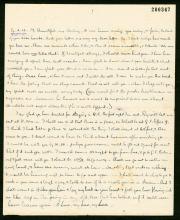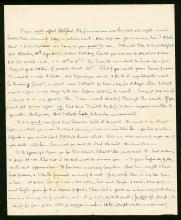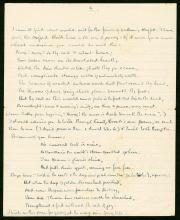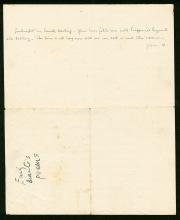BRACERS Record Detail for 19358
To access the original letter, email the Russell Archives.
"My Beautiful, My Darling, It was heaven seeing you today, and feeling the touch of your dear hands."
There are three sets of transcriptions of this letter. Each set is dated differently, although the original letter contains only one date. The first set (document .052446, record 99921; and document .201148, record 116377) contains the first two paragraphs of the letter. The third paragraph has not been transcribed. The set is dated with the same date as the original letter.
The second set (document .052447, record 99924; and document 201149, record 116378) contains the fourth and fifth paragraphs of the letter. The set is dated "Thursday 5th". A phrase "to amuse you" is omitted.
The third set (document .052448, record 99925; and document 201150, record 116379) contains the remainder of the letter. The set is dated "Friday 6th".
Letter 95
BR TO CONSTANCE MALLESON, 4 SEPT. 1918
BRACERS 19358. AL. McMaster
Previous Brixton letter, BRACERS 18691; next letter, BRACERS 47456
Edited by K. Blackwell, A. Bone, N. Griffin and S. Turcon
<Brixton Prison>1
Sp. 4. 18.
My Beautiful, my Darling, it was heaven seeing you today,2 and feeling the touch of your dear hands. And your letter is a very very dear letter.3 No, I don’t realize how much you love me. There are moments when I do, and then it seems incredible, and I think “No one could love me like that”. If I realized always, I should never hurt you. I have been realizing it afresh these last weeks. I am glad to know about your health4 and what worried you. I am glad your Dr. is a woman — I am sure it is better for that sort of thing. Dear Love, when I come out I will do all I can to make you less tired. I have the feeling that no sleep counts that is not with you — when I sleep with you, my spirit rests5 as well as my body. (You won’t find the porter6 troublesome as regards me, because he knows me and won’t be surprised to see me about. He will be all right altogether if he is well tipped.)
I am glad you have decided for staying in R.C. the first night I am out. They will let me out at 8.30 a.m. I shall see to it that there is a taxi, so I shall be at G.S. before 9. I think I had better go there and collect all the things I shall want at Ashford, and then come to you. I don’t want to have to think about business after meeting you. I could be with you by 10.30 — perhaps your woman could be got rid of early for once? But if it suits you better I could come straight to you from here, and go to G.S. later — only I feel once with you I shan’t be able to go away. Shall we go out to rather an early lunch, and have our evening meal at home — something that needs no cooking. It would be heavenly not to have to go out again. — I shall want to cling to you and rock in your arms and laugh and cry, and look to see if it is really you or a dream. And I shall want to stroke your hair and lay my head on your breast and feel your love flowing into me like sap in the spring in an old tree that has looked as if it could never have leaves again. O Love, my Love, my Love.
I can well afford Ashford. My finances are working out all right — much better than seemed likely a while back.7 How long can you manage there? Make that and Winchelsea8 as long as you possibly can. I should like to be at Ashford till Monday 14th and go to Winchelsea that day. Could you manage to stay at Winchelsea till the week-end, i.e. 18th or 19th? Then I would come back to London for a few days, and go to Ottoline if possible about 22nd. But if you could spare longer of course I would make it later; only I fancy you can’t. I think it very likely she won’t be leaving Garsn., in which case I shall go there, say for 3 days. Then I shall want a few more days by the sea before settling to work. I want sea aira in my lungs and in my spirit, then I can work steadily through the winter. If you can’t get away again at that time I will try to find some vigorous walker to go with — Dakyns9 say. But I shall hate to be away unnecessarily.
It is a great comfort that Priscilla took it so well.10 She must be an Angel. Tell me what you meant about growing more and more like her — you had something definite in your mind, but I didn’t know what. Tell me also as much as you can of your talk with her — how much you said, and what she said. It interests me.
In the typescript I gave you11 for Miss Wrinch, I should like you to read the last sentence, and pages 26–30.12 The rest is too technical to amuse you. — I grow happier day by day, as the end approaches. It has been a weary long time. But I am very fit, I have hosts of ideas, and I look forward immensely to work. Yes, work done is very like being in love — at its best, almost more intoxicating, but much briefer and rarer, and one pays a much higher price for it in expense of spirit. I have had in prison one or two really good ideas, meaning some years of working out. It is such a joy to do something fruitful after ploughing the sands for four years.13 All you say of your work on Wuthering Heights14 interests me enormously.
I cannot find what would suit for the finale of Wuthering Heights. I have only the Oxford Book15 here in the way of poetry. If it were for a more select audience you could do with this:
Away! away! to thy sad and silent home;16
Pour bitter tears on its desolated hearth;
Watch the dim shades as like ghosts they go and come,
And complicate strange webs of melancholy mirth.
The leaves of wasted autumn woods shall float around thy head,
The blooms of dewy Spring shall gleam beneath thy feet:
But thy soul or this world must fade in the frost that binds the dead,
Ere midnight’s frown and morning’s smile, ere thou and peace, may meet.
(From Shelley, poem beginning “Away! the moor is dark beneath the moon”.) I should advise you to look through Emily Bronte’s own poems, or send them to me (I don’t possess them and should like to) and I will look through them. Presumably you know:
No coward soul is mine,17
No trembler in the world’s storm-troubled sphere:
I see Heaven’s glories shine,
And faith shines equal, arming me from fear.
Do you know “Cold in the earth and the deep snow piled above thee”18 (on her brother), especially:
But when the days of golden dreams had perished,
And even Despair was powerless to destroy,
Then did I learn how existence could be cherished,
Strengthened and fed without the aid of joy.
I lived on this poem for years, at the worst time of my life.19
Goodnight my lovely Darling. Your love fills me with happiness beyond all telling. The time is not long now till we can rest in each other’s arms.
Your
B.
- 1
[document] The letter was edited from the initialled, twice-folded, two-sheet original in BR’s hand in the Malleson papers in the Russell Archives. Written sideways by Colette at the bottom of the letter: “Emily Brontë’s poems”.
- 2
heaven seeing you todayColette had been to visit him.
- 3
your letter is a very very dear letter Colette’s letter of 3 September 1918 (BRACERS 113156). She probably gave the smuggled letter to him during her visit.
- 4
to know about your healthColette’s edited letter of 3 September explains that her doctor thought her “inside” needed attention as her “old trouble” had returned (BRACERS 113156). See also Letters 99 and 100. In view of Colette’s “doctoring myself” for the recurrence of the old trouble in 1920, her medical problem would hardly be related to the “numbers of abortions” she told K. Blackwell she had had in her youth, adding that “abortions need not be secret” (anymore, she meant) (1 Feb. 1975, BRACERS 121694).
- 5
when I sleep with you, my spirit restsCf. Letter 13: “ordinary rest is only for the body, while the rest you give me is rest for the soul.”
- 6
porter The porter at Russell Chambers, where BR’s flat was located and where Colette was going to live.
- 7
My finances … a while back. See Letter 15, note 22.
- 8
Winchelsea Miss Rinder had offered her family’s cottage as a place to stay once BR left prison. Windmill Cottage was in Icklesham, near Winchelsea. Although not on the coast, it was not far away.
- 9
vigorous walker … Dakyns The two men had no doubt often hiked together (see BRACERS 18694), including the walking tour of the Scottish Highlands on which Dakyns and others joined BR and Alys in August 1907.
- 10
Priscilla took it so wellColette revealed that she had told Priscilla the nature of her relationship with BR while they were away together at St. Margaret’s Bay and that Priscilla had understood it (25 Aug. 1918; BRACERS 113153). BR had already noted this in Letter 86, indicating he was glad Priscilla knew.
- 11
typescript I gave you A review of John Dewey’s Essays in Experimental Logic, first published in The Journal of Philosophy, Psychology, and Scientific Methods 16 (2 Jan. 1919): 5–26; reprinted as 16 in Papers 8. After BR’s death Colette sold McMaster the printer’s copy of the typescript (RA Rec. Acq. 411).
- 12
read the last sentence, and pages 26–30. The last sentence is: “Meanwhile, whatever accusations pragmatists may bring, I shall continue to protest that it was not I who made the world” (16 in Papers 8). A prison allusion was at the start of BR’s rejoinder to Dewey, on the aloofness of the knower: “Will the present amusing inappropriateness of these remarks to the case of one at least among analytic realists suggest to Professor Dewey that perhaps he has somewhat misunderstood the ideal of contemplation?” (8: 148). The reference to “26–30” is to the last pages of section II of the typescript, against instrumentalism and in favour of contemplation and escape from one’s personality. BR wrote a similar note on the first leaf, in faint pencil: “See pp 26–30, beginning ‘Prof. Dewey, in an admirable passage’” (Papers 8: 149: 29). Gladys Rinder had given BR the typescript, along with proofs, in her letter of 3 September 1918 (BRACERS 79631).
- 13
after ploughing the sands for four years BR’s previous big idea was in 1914, the theory of perspectival space. See Letter 59, note 2.
- 14
your work on Wuthering HeightsColette was dramatizing the novel for the stage. There is no confirmation that she completed the task.
- 15
Oxford BookThe Oxford Book of English Verse, ed. A.T. Quiller-Couch. Russell’s library has the 1904 edition, published by the Clarendon Press.
- 16
Away! away! to thy sad and silent home The lines that BR quoted are from the second stanza of Shelley’s poem “Remorse”, Oxford Book of English Verse, no. 617.
- 17
No coward soul is mine The first line of the poem “Last Lines” by Emily Brontë; BR quoted only the first stanza.
- 18
“Cold in the earth and the deep snow piled above thee” The first line of Brontë’s poem “Remembrance”; BR then quoted the lines from the sixth stanza.
- 19
But when … golden dreams had perished … aid of joy … worst time of my life In an earlier prison letter to Ottoline, BR alluded to the “absolute despair” he had experienced three decades previously — probably as a student at an “Army crammer” (see Letter 66, note 7). But surely these lines comforted BR not then, but when his love for Alys crumbled in 1901–02 and through years of unhappy marriage until their separation in 1911. When BR’s emotional life was in turmoil from the initial breakdown of his marriage, his intellectual hopes also received the worst possible setback when he discovered what became known as Russell’s paradox, which, despite intense efforts, was not resolved until he formulated the theory of types in 1906 (and published it in 1908: see 22in Papers 5)—and even then not to his complete satisfaction.
Textual Notes
- a
sea air BR wrote “see air”.




